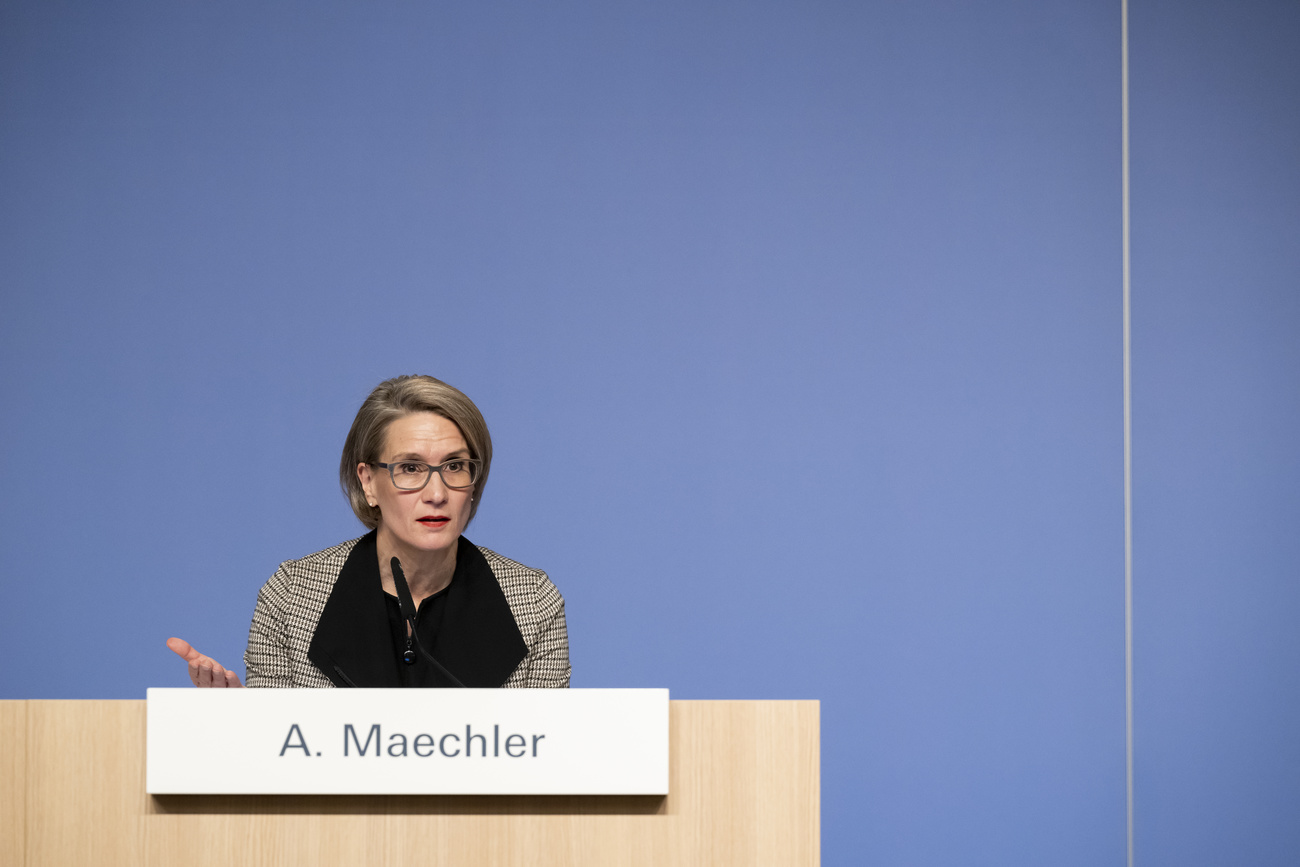
Who will replace Andréa Maechler on the SNB’s board?

Andréa Maechler, a member of the governing board of the Swiss National Bank, will step down at the end of June. SWI swissinfo.ch names five possible successors. They are almost all well connected internationally.
Names of possible successors are circulating following the resignation of Andrea M. Maechler, head of Department III at the Swiss National Bank. The government will soon choose a new member of the governing board. In addition to professional qualifications, gender and origin will play a role – the two remaining governors, SNB President Thomas Jordan and Vice-President Martin Schlegel, are both German-speaking Swiss men.
In a first step, the SNB council proposes a candidate to the government. The council is the supervisory board of the SNB; it is composed of representatives of the cantons, academia and business. The government then appoints an SNB governor. The government has a free hand and is not bound by the council’s proposal. However, the government would have to justify any deviation from the bank’s proposal and politically, it would be a seen as a rebuff to the SNB. Parliament has no say in the matter.
Who might be in the running? SWI swissinfo.ch has an overview of the candidates and can give the lowdown on their international connections.
Marlene Amstad
Marlene Amstad (55) has very good prospects. She already worked for the SNB in the 2000s, including two years in the research department and six years as vice-director of the financial market analysis department. Amstad left the SNB in 2012 to work as a consultant for the Bank for International Settlements and as a professor at the Chinese University of Hong Kong. Her publications during this time included a pioneering book on digital central bank money. In spring 2020, the government appointed Amstad to the post of president of the Swiss financial market supervisor FINMA, a position she still holds today.
Amstad is capable of bringing change to the SNB: people familiar with the central bank say she already tried to introduce new ideas during her time there. Her international experience in central bank-related institutions and her intellectual independence speak in her favour. What may count against her is that she cannot bank on the support of the current SNB top management.
Beatrice Weder di Mauro
Beatrice Weder di Mauro (57) has a very good chance of winning a seat on the SNB governing board whenever a vacancy arises. She is one of Switzerland’s most respected and best-connected economists: in Washington, Weder di Mauro worked for the International Monetary Fund and the World Bank in the 1990s, in Tokyo she conducted research at the United Nations University, in Germany she served on the “Council of Economic Wise Men” between 2004 and 2012, and in Geneva she has been a professor at the Graduate Institute since 2019. She also chairs the prestigious Centre for Economic Policy Research in London.
Weder di Mauro’s most recent research was on the relationship between CO2 taxes and inflation; she has also published several papers on banking regulation. Another advantage: Weder di Mauro speaks German, French and English as well as Italian and Spanish. Other points in her favour are her experience in economic policy committees, her international network and her extensive contribution to academic research. On the minus side, she was viewed as a candidate for the last-but-one vacancy on the SNB governing board, but removed herself from the race by taking on a board mandate at UBS. She is said to have no interest in a leadership role at the SNB.
Petra Gerlach
Petra Gerlach (48) has a good chance. She received her doctorate from the University of Basel in 2002. After that, she was briefly at Hong Kong University, took her first job at the SNB (2004-2009), then accepted a teaching position at the University of Basel (until 2009) before taking a job at the Bank for International Settlements (until 2011). Then followed a period of research at Dublin’s renowned Trinity College until 2014. Since her return to Switzerland, Gerlach has been working for the SNB again. Most recently, she was promoted to the SNB’s extended governing board in August 2022, overtaking the chief economist in the pecking order.
Gerlach is regarded as an affable but tough economist. Points in her favour are her steep ascent through the ranks of the SNB and her experience as head of a wide-ranging department for monetary policy analysis. What may count against her is that Jordan and Schlegel, the two other SNB governors, were also internal appointments.
Sarah Lein
Sarah Lein (ca. 1980) has an outside chance. The German-Swiss dual citizen studied at the University of Konstanz in the 2000s. Later she moved to Zurich, where she earned her doctorate in 2009. She then served six years as the SNB’s senior economist, then another six years as an assistant professor at the University of Basel. Since 2021, Lein has been a professor of economics at the University of Basel.
Lein has made a name for herself as a top-class researcher in the field of pricing. Lein’s advantage is that she is a proven inflation expert. As an empiricist, she also knows about the latest trends in inflation forecasting. Points against Lein are her relatively young age and her lack of practical experience at the top of economic policy institutions.
Cédric Tille
The French-speaking economist Cédric Tille (53) is also in the running. He completed his doctorate at the end of the 1990s at Princeton University with the influential economists Michael Woodford and Kenneth Rogoff and has been a professor at the Graduate Institute in Geneva since 2007. He is also a member of the SNB council, the central bank’s supervisory board. He will leave this year due to term limits. In contrast with the last time a vacancy on the SNB governing board arose, his role on the council no longer stands in his way.
Tille has published dozens of research papers on international capital flows and currency markets, some with a focus on Switzerland. His views on monetary policy are strongly influenced by his American education: in confidence, he criticises the SNB’s conservative stance. Among his strengths is his proven monetary expertise. What may work against him is that Tille is considered a left-wing economist, which is at odds with the SNB’s conservative profile.
Aymo Brunetti
Aymo Brunetti (60) has been a candidate for the SNB governing board for years. However, his chances of being appointed are small. Brunetti was chief economist at the State Secretariat for Economic Affairs between 2003 and 2012; he also led the government’s group of experts on banking regulation in the wake of the near-collapse of UBS in 2008. He is currently a professor at the University of Bern, where he is known for his outstanding teaching.

More
ʿInflation will keep us busy for a long time to comeʾ
Brunetti is well connected in Switzerland but little known internationally. His leadership experience counts in his favour. Disadvantages could be his modest research record and his comparatively high age. In June 2021, Brunetti said on the Geldcast podcast that he would not be available.

In compliance with the JTI standards
More: SWI swissinfo.ch certified by the Journalism Trust Initiative






























You can find an overview of ongoing debates with our journalists here . Please join us!
If you want to start a conversation about a topic raised in this article or want to report factual errors, email us at english@swissinfo.ch.